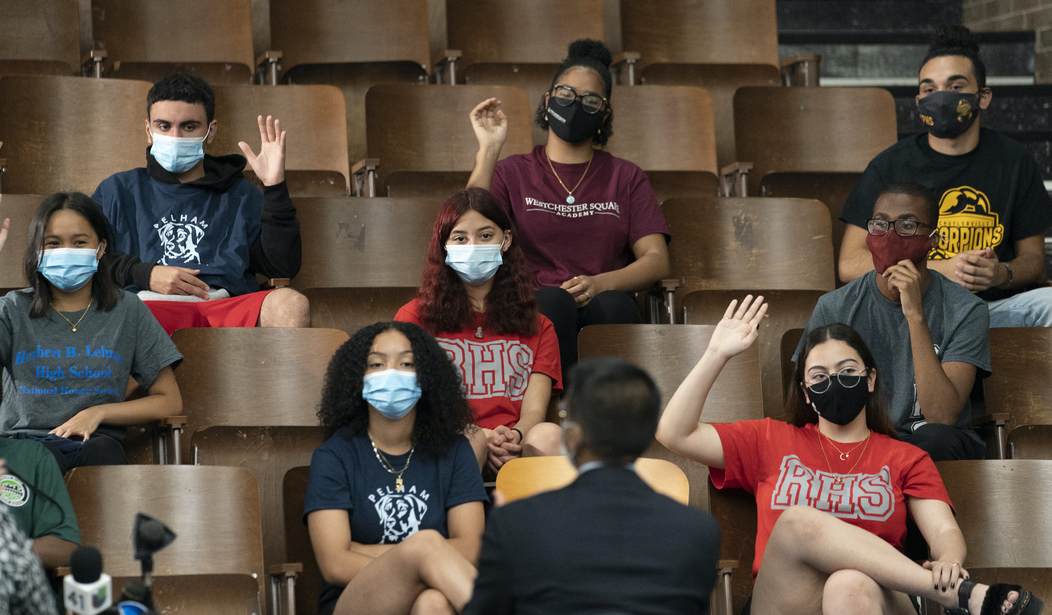Biologically, I’m black and white. As an adoptee with brown skin from a very diverse family, I’m grateful that my mother (who happens to have skin much lighter than mine) provided all kinds of books about black American history-makers. There are so many incredible stories that should be intertwined in an educational fabric that celebrates every thread from every hue of trailblazer. But we shouldn’t have separate months to teach fractured history based on color or gender. It's all American history.
Frederick Douglass’ The North Star newspaper had a slogan that sums up how we should look at humanity: “Right is of no sex—Truth is of no color—God is the Father of us all—We are all brethren.” Yet, still, in 2022, we often fail to live up to Douglass’ declaration. But the beauty in failure is knowing we can still get it right.
Negro History Week was created by black educator and historian Carter G. Woodson to fill in the massive gaps in America’s public education. It was first officially recognized in 1975 by Republican President Gerald Ford who proclaimed, in part: “Emphasis on these achievements in our schools and colleges and in daily community life places in timely perspective the benefits of working together as brothers and sisters regardless of race, religion or national origin for the general well-being of all our society.” Ford also officially recognized what became to be known as Black History Month in 1976.
Here are five of the most important lessons I feel we can all learn during this month:
Every person is a human. Every human is a person. The historic struggle of black Americans in this country was rooted in the denial of personhood. When we fail to embrace our God-given humanity, we get the injustices of Dred Scott v. Sanford, Plessy v. Ferguson, Buck v. Bell, Roe v. Wade and more. Whenever any group of people appoint themselves arbiters of human worth, it’s always disastrous. The most vulnerable and most marginalized always suffer from that arrogant abuse of power. When we see and embrace the humanity and equal worth in every member of the human family, we all benefit.
Recommended
We’re Stronger Than Our Circumstances. Overcoming slavery seemed impossible. Overcoming Jim Crow seemed impossible. Overcoming KKK violence seemed impossible. But our strength, in the face of evil, is drawn from substance much stronger than self. Philippians 4:13 makes it clear: “I can do all things through Christ who strengthens me.” Freedom fighters understood this then and their tenacity proved that unjust might had to eventually bow to what was right. Thank you to those who committed their lives to non-violence to bring about seismic changes in our nation. We live in the beautiful reverberations of that unshakeable faith—a society radically transformed because of the indefatigable will of the remnant.
We are one human race. Racism is given power because people give into an insidious lie—that we’re actually separate races. First classified as such in 1758, the deeply flawed construct of race has never served as a benefit to humankind. Ever. Even today, with Critical Race Theory infecting so many facets of society, we’re told that color comes first and character is irrelevant. Those hellbent on dividing us by any rhetorical means necessary demand we see everything through the broken prism of “race.” Acts 17:26 clearly states: “>From one man he created all the nations throughout the whole earth.” Abolitionists, white and black, joined together as brothers and sisters to end the heinous injustice of slavery, fought to erase the evils of Jim Crow, and today fight the systemic racism of a multi-billion-dollar abortion industry that violently denies human equality.
Evil flourishes when the Church is silent. Proverbs 31:8-9 isn’t a suggestion about speaking for those who cannot; it’s a clarion call: “Speak up for those who cannot speak for themselves; ensure justice for those being crushed. Yes, speak up for the poor and helpless, and see that they get justice,” Dr. Martin Luther King excoriated Christian leaders for their unwillingness to fight for civil rights in Letter from Birmingham Jail. King said: “The contemporary church is so often a weak, ineffectual voice with an uncertain sound.” Today, on a host of moral/spiritual issues like abortion, LGBT pseudoscience, human trafficking and religious freedom, the Church’s sound is often that of silence. We don’t need apologies decades from now about regret for inaction. We need the Church to illuminate God’s love of justice now.
Forgiveness is better than revenge. In 1872 while expressing their support for
the Ku Klux Klan Act, an act solely passed by Republicans to quell Democrat-founded KKK violence, black Republican congressmen proclaimed: “We have open and frank hearts toward those who were our former oppressors and taskmasters. We foster no enmity now, and we desire to foster none for their acts in the past to us, nor to the Government we love so well.” This is so contrary to today’s self-anointed “anti-racists” and leading hashtag movements whose exploitation and practice of discrimination is no better than the (alleged or real) racism they decry. Without faith-filled forgiveness, we’re forced to live in fiction-filled friction. I choose the former. I want my mixed children to have hearts for justice and minds that relentlessly pursue the Truth. Any social movement rooted in bitterness will never project strength; it will always perpetuate weakness.
History is powerful. We’re not meant to live in it but learn from it. And those lessons we glean from our past can enable us all to move, unshackled, into a hopeful and freer future.

























Join the conversation as a VIP Member